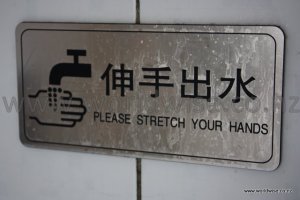TRAVELLERS DIARRHOEA – A common concern for travellers!
July 27, 2010
You’re travelling on a 13 hour train trip across India.
You’ve just boarded and managed to get a seat. You’ve got your book or your ipod and you’re sorted. Then… oh NO!…. your bowels have become loose!
There are minimal station stops and the toilet consists of a hole in the floor of the carriage – the train tracks zooming past underneath you… and no toilet paper.
I don’t need to paint the picture any more than that suffice to say that it will probably remain the worst train trip of your life.
Travellers Diarrhoea – one of the most common health problems for travellers.
Some 30% of sufferers are confined to bed, and a further 40% are forced to change their travel plans.
Symptoms – Travellers Diarrhoea is defined as greater than or equal to 3 loose bowel motions (stools) within 8 hours or greater than or equal to 4 within 24 hours…plus 1 of:
· Nausea
· Vomiting
· Abdominal cramps
· Mild fever
How is it spread?
The disease is caused by micro-organisms (bacteria, viruses and parasites) that damage the gut.
It is spread by consuming contaminated food and water.
By touching food with unclean hands.
When eating and drinking, WORLDWISE apply the adage:
“COOK IT, PEEL IT, BOIL IT OR AVOID IT”
Be sensible with your eating and drinking whilst travelling to at risk areas.
· Drink bottled, filtered, purified and carbonated water. If buying bottled water, make sure that
the bottle is properly sealed. Remember to wash you teeth with this safe drinking water
· Choose raw fruit and vegetables that you can peel yourself
· Wash your hands with soap or hand sanitizer before eating
· Foods should be thoroughly cooked and served piping hot
UNSAFE FOODS:
· Those cooked early in the day and served at room temperature
· Salads, raw vegetables, cold buffets
· Tap water, ice cubes, ice blocks
· Poorly or uncooked seafood and meat
· Food prepared with unpasteurized milk eg: ice cream
WORLDWISE stock a variety of travel medical kits, including the ‘Gastro Pack’ that includes appropriate prophylactic antibiotics– Designed to treat Traveller’s Diarrhoea.
We also stock a range of water purification products.
Please contact us if you would like more information on these products.
Check out our Facebook photo album dedicated to ‘Food and Water encounters’ whilst travelling
Travel and Tropical Medicine is a growing specialization. With around 2 million kiwis travelling overseas per year, Travel Health Professionals need to be regularly updated in global travel health information.
The WORLDWISE ONLINE Seminars have been annually presented for the last 12 years, and are the longest ongoing regular ‘open’ travel health meetings in Australasia.
This year’s WORLDWISE ONLINE conference offers Health Professionals a solid platform on which to learn and up-skill knowledge in this exciting specialization. It is aimed at all Primary Health Care Practitioners (General Practitioners, Public Health Physicians, Infectious Disease Specialists, Military medical Staff, Pharmacists) with an interest in travel medicine. Primary Healthcare Nurses who have attended previous WORLDWISE ONLINE Level 1 courses are also invited to attend this annual meeting.
This year, the primary focus of the Conference will be on Corporate travellers and families travelling to the Asia – Pacific region. Special focus will be on
i) ‘rabies in our region’
ii) the safety of travel
iii) how to develop a risk analysis of a travel itinerary
iv) Women and children travellers
There are to be special sections on ‘country based requirements’ for travel to South East Asia and Oceania.
The conference will be hosted at Hotel So in Central Christchurch. A hotel which implements sustainable business practices that reduce its ecological footprint.
LEARNING OBJECTIVES
- To understand safe practice in the delivery of health care to intending travellers, particularly to those travelling to the Asian and Pacific region
- To update knowledge on current pertinent travel health issues and its relevance to current medical practice
- To understand and develop knowledge base in Travel and Geographical Medicine practice
- To identify when it is vital to refer patients/travellers to specialty services
- To understand the advice that corporate travellers need to keep them well on overseas deployment
- To understand what responses are needed in global emergency
PROGRAMME AT A GLANCE
- Travelling groups and corporates – Risk assessment
- Life style issues of Travellers – Sex and STI’s
- Medical Tourism – The Thailand Experience
- Update on Dengue Fever – Current thinking and into the future
- Food and Water borne issues – The family holiday, outbreaks
- Woman and children travellers – management, the pregnant traveller
- Mosquito borne diseases
- Wilderness weather extremes and travel – Creepy Crawlies , the essence of management
- Region specific destinations – Asia, Pacific
- Post natural disaster outbreaks – Thailand and Samoa experiences
- Update on Malaria – Future developments
- Rabies – devising a management plan, the Bali experience
WORLDWISE Post Graduate Conference Advanced Level – The New Zealand Advanced course in Travel, Tropical and Geographical Medicine for Travel and Primary Health Care Practitioners – has been endorsed by The Royal New Zealand College of General Practitioners (RNZCGP) and has been approved for up to 13.25 Hours CME for General Practice Educational Programme Stage 2 (GPEP2) and Maintenance of Professional Standards (MOPS) purposes.
For more information, full programme details or registration, please contact Clare at online@worldwise.co.nz or 09 520 5830
We look forward to seeing you there!





